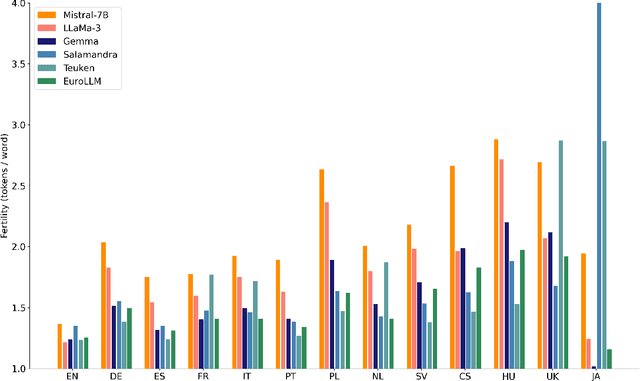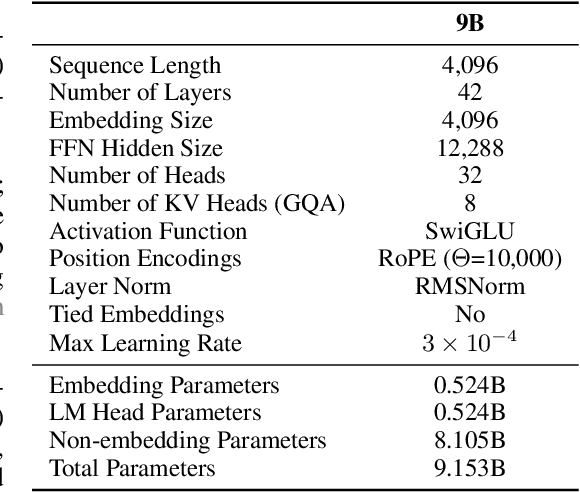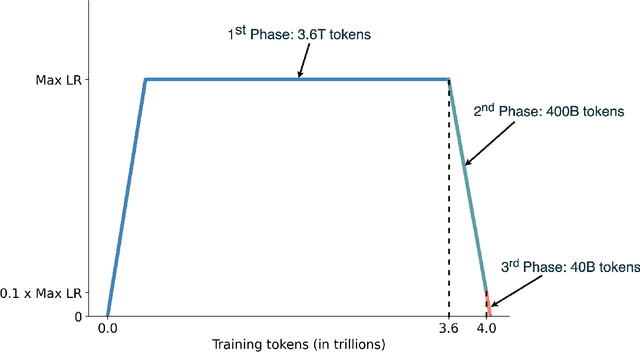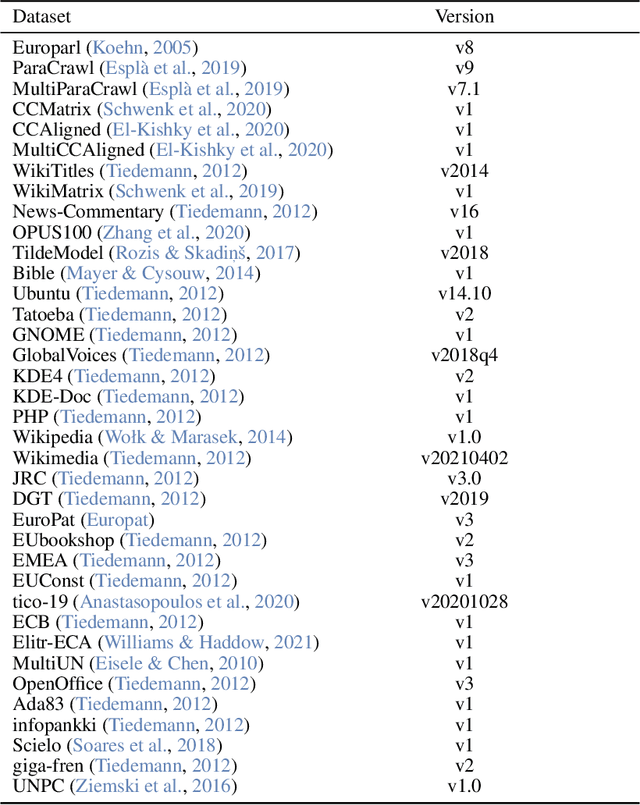Amin Farajian
EuroLLM-22B: Technical Report
Feb 05, 2026Abstract:This report presents EuroLLM-22B, a large language model trained from scratch to support the needs of European citizens by covering all 24 official European Union languages and 11 additional languages. EuroLLM addresses the issue of European languages being underrepresented and underserved in existing open large language models. We provide a comprehensive overview of EuroLLM-22B's development, including tokenizer design, architectural specifications, data filtering, and training procedures. Across a broad set of multilingual benchmarks, EuroLLM-22B demonstrates strong performance in reasoning, instruction following, and translation, achieving results competitive with models of comparable size. To support future research, we release our base and instruction-tuned models, our multilingual web pretraining data and updated EuroBlocks instruction datasets, as well as our pre-training and evaluation codebases.
EuroLLM-9B: Technical Report
Jun 04, 2025



Abstract:This report presents EuroLLM-9B, a large language model trained from scratch to support the needs of European citizens by covering all 24 official European Union languages and 11 additional languages. EuroLLM addresses the issue of European languages being underrepresented and underserved in existing open large language models. We provide a comprehensive overview of EuroLLM-9B's development, including tokenizer design, architectural specifications, data filtering, and training procedures. We describe the pre-training data collection and filtering pipeline, including the creation of EuroFilter, an AI-based multilingual filter, as well as the design of EuroBlocks-Synthetic, a novel synthetic dataset for post-training that enhances language coverage for European languages. Evaluation results demonstrate EuroLLM-9B's competitive performance on multilingual benchmarks and machine translation tasks, establishing it as the leading open European-made LLM of its size. To support open research and adoption, we release all major components of this work, including the base and instruction-tuned models, the EuroFilter classifier, and the synthetic post-training dataset.
EuroLLM: Multilingual Language Models for Europe
Sep 24, 2024Abstract:The quality of open-weight LLMs has seen significant improvement, yet they remain predominantly focused on English. In this paper, we introduce the EuroLLM project, aimed at developing a suite of open-weight multilingual LLMs capable of understanding and generating text in all official European Union languages, as well as several additional relevant languages. We outline the progress made to date, detailing our data collection and filtering process, the development of scaling laws, the creation of our multilingual tokenizer, and the data mix and modeling configurations. Additionally, we release our initial models: EuroLLM-1.7B and EuroLLM-1.7B-Instruct and report their performance on multilingual general benchmarks and machine translation.
Is Context Helpful for Chat Translation Evaluation?
Mar 13, 2024



Abstract:Despite the recent success of automatic metrics for assessing translation quality, their application in evaluating the quality of machine-translated chats has been limited. Unlike more structured texts like news, chat conversations are often unstructured, short, and heavily reliant on contextual information. This poses questions about the reliability of existing sentence-level metrics in this domain as well as the role of context in assessing the translation quality. Motivated by this, we conduct a meta-evaluation of existing sentence-level automatic metrics, primarily designed for structured domains such as news, to assess the quality of machine-translated chats. We find that reference-free metrics lag behind reference-based ones, especially when evaluating translation quality in out-of-English settings. We then investigate how incorporating conversational contextual information in these metrics affects their performance. Our findings show that augmenting neural learned metrics with contextual information helps improve correlation with human judgments in the reference-free scenario and when evaluating translations in out-of-English settings. Finally, we propose a new evaluation metric, Context-MQM, that utilizes bilingual context with a large language model (LLM) and further validate that adding context helps even for LLM-based evaluation metrics.
Tower: An Open Multilingual Large Language Model for Translation-Related Tasks
Feb 27, 2024



Abstract:While general-purpose large language models (LLMs) demonstrate proficiency on multiple tasks within the domain of translation, approaches based on open LLMs are competitive only when specializing on a single task. In this paper, we propose a recipe for tailoring LLMs to multiple tasks present in translation workflows. We perform continued pretraining on a multilingual mixture of monolingual and parallel data, creating TowerBase, followed by finetuning on instructions relevant for translation processes, creating TowerInstruct. Our final model surpasses open alternatives on several tasks relevant to translation workflows and is competitive with general-purpose closed LLMs. To facilitate future research, we release the Tower models, our specialization dataset, an evaluation framework for LLMs focusing on the translation ecosystem, and a collection of model generations, including ours, on our benchmark.
 Add to Chrome
Add to Chrome Add to Firefox
Add to Firefox Add to Edge
Add to Edge